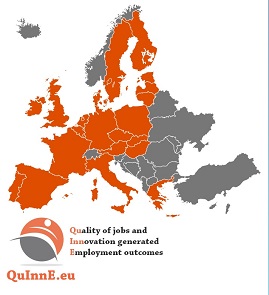IER News & blogs
Investing in adult education: health and well-being benefits

The APPG for Adult Education commissioned the Warwick Institute for Employment Research in 2016 to conduct research into the needs of adult learners. This work was supported by the Institutes for Adult Learning (IALs). The nine Specialist Designated Institutions (SDIs), including City Lit, Morley College, Hillcroft College, Northern College, Ruskin College, Working Men’s College, Mary Ward Centre, Fircroft College and the Workers’ Educational Association (WEA),– each has its own identity, mission and distinctive approach, which adds to the rich diversity of adult education.
Our primary focus was on adult education, and on adults returning to learn. Learning can occur in education or training institutions (offline or online), the workplace (on or off the job), the family, or cultural and especially, community settings. Findings from this in-depth study highlighted local and newly Combined Authorities will be accountable for the allocation of funds with Local Enterprise Partnerships (LEPs) in setting the agenda and identifying priorities within local communities. It is, therefore, critical that the contribution of adult education, including its contribution to improving health and well-being (which are pre-requisites for progression into and within employment), must not be lost or forgotten within current and any new devolution arrangements.
It is clear that most providers of adult education have invested in reaching out to people who are disadvantaged one way or the other. Many of whom would not otherwise know about adult education and what it could do for people in their circumstances. Adult education providers have developed the expertise, teaching skills and resources to deliver non-qualification provision and/or bite-sized units that successfully engage these adults in learning again, offering a stepping stone to success. Therefore, any policy or practical interventions need to reflect this and provide flexibility. Post-devolution, local Skills Commissioners will be required to make investment decisions - which is why their role is so central to the sustainability of adult education now and in the future.
IER'’s formal ‘Call for Evidence’ in 2017 has a distinctive focus on adult education, health and well-being. The main purpose is to gather the views of key stakeholders, partners and providers on the contribution of adult education to health and wellbeing outcomes. We have deliberately not attempted to define the parameters of the Call For Evidence too tightly as we want respondents to explore many different aspects of health and wellbeing. We hope to hear from those interested in any aspect of physical or mental health, including health and wellbeing in the context of age, disability, ethnicity, gender and location. For further information contact: Dr Deirdre Hughes OBE, deirdre dot hughes at warwick dot ac dot uk.
Online map of innovation, job quality and employment outcomes in the UK and the rest of Europe
 Based on new statistical analysis from its Horizon 2020 project ‘QuInnE’, the team have just published an online map that calculates and compares innovation, job quality and employment outcomes for the EU and its Members states. It shows that the UK is 'medium-high' on job quality, with high wages but also high part-time and short part-time working. The UK is 'medium-high' on innovation: output indicators at the firm level are high but levels of innovation enablers at the national and employee levels are lower. The UK is 'high-high' on employment performance, with a high level of employment for the prime-age population (25 to 54 years) and relatively high levels of employment for vulnerable groups. Further details of QuInnE, please contact ier at warwick dot ac dot uk.
Based on new statistical analysis from its Horizon 2020 project ‘QuInnE’, the team have just published an online map that calculates and compares innovation, job quality and employment outcomes for the EU and its Members states. It shows that the UK is 'medium-high' on job quality, with high wages but also high part-time and short part-time working. The UK is 'medium-high' on innovation: output indicators at the firm level are high but levels of innovation enablers at the national and employee levels are lower. The UK is 'high-high' on employment performance, with a high level of employment for the prime-age population (25 to 54 years) and relatively high levels of employment for vulnerable groups. Further details of QuInnE, please contact ier at warwick dot ac dot uk.
Harnessing growth sectors for poverty reduction
Two further reports have been published by Professor Anne Green, Paul Sissons (Coventry University) and Neil Lee (LSE) from an ESRC-funded project on Harnessing Growth Sectors for Poverty Reduction.
The first report on employment entry finds that there is potential for using a well-targeted, sector-focused approach to increase employment entry and help reduce poverty. Social care and the hospitality industry offer opportunities for sector-specific training programmes for people who find it difficult to access employment. But because these sectors are characterised by low pay policies need to promote career progression as well as job entry. The construction sector is also well placed to provide employment and training opportunities for local residents, and the government could encourage this through procurement and planning policies. There is also growing interest in the potential role of social enterprises in providing local jobs – especially with regard to repairs and maintenance of social housing. Sector-focused work experience is an important way of getting young people and unemployed adults skilled up for work.
The second report examines aspects of job quality. It finds that while job quality should be a critical issue for policymakers there is a lack of empirical evidence from approaches seeking to enhance job quality. Pay and job security are important elements of job quality, as are flexible employment practices that enable people to balance work and caring responsibilities. Trade unions can play an important role in improving job quality outcomes. Where there is evidence from sector-focused approaches to job quality these have sought to link changes in employment conditions with service improvements for employers; utilised procurement as an opportunity to shape job quality; or sought to encourage changes in business models as a precursor to improving job quality. There is a need to pilot and trial different approaches to improving job quality in different sectors and for different types of employment.
Technology, austerity and employability in urban labour markets
 Professor Anne Green has had an article published in the journal Urban Studies. The article discusses two key changes affecting employability, labour market operation and policy delivery are austerity and the expansion of the use of information and communication technologies (ICT), especially web-based technologies. Increasingly, given pressures for cost savings and developments in ICT, employers’ recruitment and selection strategies are at least partly web-based, careers guidance and public employment services are moving towards ‘digital by default’ delivery and job seekers are expected to manage their job search activity and benefit claims electronically. It asks the question: what are the implications of austerity and technological change for employability?
Professor Anne Green has had an article published in the journal Urban Studies. The article discusses two key changes affecting employability, labour market operation and policy delivery are austerity and the expansion of the use of information and communication technologies (ICT), especially web-based technologies. Increasingly, given pressures for cost savings and developments in ICT, employers’ recruitment and selection strategies are at least partly web-based, careers guidance and public employment services are moving towards ‘digital by default’ delivery and job seekers are expected to manage their job search activity and benefit claims electronically. It asks the question: what are the implications of austerity and technological change for employability?
The article presents a critical review of the literature on ICT and its relation to, and implications for, employability in a context of austerity. A new framework for employability is presented and those aspects of employability where ICT plays a key role are highlighted. It is concluded that in the context of austerity and technological change more is demanded of individual job seekers/workers, as they are expected to take greater responsibility for their marketability in the labour market. This means that individuals’ attributes and skills are of enhanced importance in conceptualisations of employability. ICT skills have a key role to play in employability, but not at the expense of more conventional social skills which remain very important alongside digital literacy.
Green, A.E. (2017). Implications of technological change and austerity for employability in urban labour markets, Urban Studies, 54(7) pp. 1638–1654. DOI: 10.1177/0042098016631906
Brexit briefings on employment
 As part of the Warwick's faculty of social sciences CREW network, IER, the Law School and the Industrial Relations Research Unit have an award from the Higher Education Innovation Fund to produce a series of Brexit Briefings on Employment. The four thematic briefings will focus on job loss and job creation; training for the unemployed; employment rights and regulation; migration and skills. Each will present key research evidence and make recommendations for the development of new policy as the UK exits the EU. Each will also have a public launch over May-July this year.
As part of the Warwick's faculty of social sciences CREW network, IER, the Law School and the Industrial Relations Research Unit have an award from the Higher Education Innovation Fund to produce a series of Brexit Briefings on Employment. The four thematic briefings will focus on job loss and job creation; training for the unemployed; employment rights and regulation; migration and skills. Each will present key research evidence and make recommendations for the development of new policy as the UK exits the EU. Each will also have a public launch over May-July this year.
For further information, contact Professor Chris Warhurst, Dr Ania Zbyszewska or Professor Guglielmo Meardi at ier at warwick dot ac dot uk

